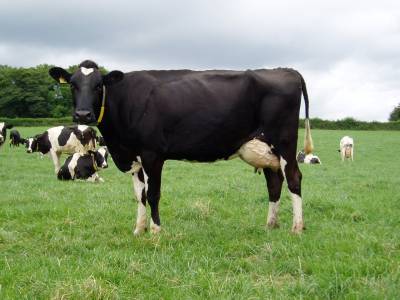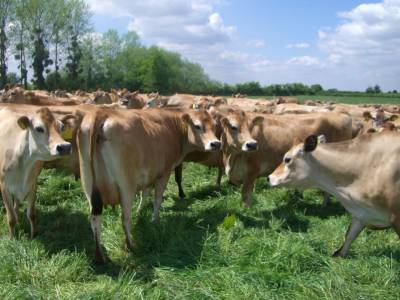

At January's conference dairy delegates attended a condensed version of the AHDB Breeding Blocks workshop which had run during October and November 2019, hosted by Marco Winters and Fern Pearston from AHDB’s Animal Genetics team.
The workshop began with a discussion around who is responsible for making the breeding decisions on farms and who makes up the team when these decisions are made. The highest proportion of delegates either included their breeding consultant or made the decisions alone (23% each), with semen reps and vets involved less often (10% each). When asked about confidence levels in discussing breeding goals and strategies, 63% of delegates were confident with these conversations but 27% felt like they were lacking some knowledge.
The workshop then discussed data to use when making breeding decisions, this fell into three categories; on-farm recordings, bull genetic evaluations and herd genetics. The first topic highlighted the importance of keeping accurate on-farm records and using health records in addition to milk records to select females to breed, or not breed, replacements from.
Bull proofs available for selection were covered next; from the vast number of traits now with a genetic index (e.g. production, health and welfare and functionality traits), to how the UK economic indexes weights these traits to breed cows best suited to various farming systems (Profitable Lifetime Index (£PLI, for all year round calving herds), Spring Calving Index (£SCI, for spring-block calving herds) and Autumn Calving Index (£ACI, for autumn-block calving herds)). In addition to the make-up of the indexes and the system they are appropriate for, the workshop also covered how to best use the information when selecting sires;
- Identify the economic index appropriate to your calving system - £PLI, £SCI or £ACI
- Use the available bull lists on the AHDB website to shortlist the top 50% of bulls on your chosen index. For £PLI users, these lists are breed specific as each breed is expressed against its own base; £SCI and £ACI can compare bulls across breeds. The cut-off to make the top 50% of the list can be found on the AHDB website (dairy.ahdb.org.uk/technical-information/breeding-genetics/how-to-select-your-mating-sires/)
- Identify bulls which enhance your herd strengths while addressing your herd weaknesses. Lifespan and Fertility Index should always be part of this
- Use a reasonable spread of bulls on the herd. The number of bulls to use in a year should be guided by their reliability
Delegates were shown how the filtering options on the AHDB bull lists and the new Breeding Trait Selector tool could assist this process.
Next, herd genetics were discussed and AHDB’s Herd Genetic Report and Inbreeding Checker were covered in detail. These tools are available to all fully milk recorded herds in the UK with NMR, CIS, Dale Farm and QMMS and outlines the herd’s genetic strengths and weakness as well as allowing the user to delve down into individual cow and youngstock genetic evaluations.
A practical session followed, where delegates were given the opportunity to apply their learnings from the first part of the workshops. Delegates were handed a pack of AHDB’s Breeding Blocks cards of fictitious sires, as well as an example herd for them to identify the sires they would use on the herd to address their needs.
The workshop next covered the ‘Top Tips’ when buying semen; Preparing to purchase, Conversation with the breeding rep and reviewing the conversation, Consider semen in the tank and Reviewing breeding replacements. As part of this the Breeding Season Semen calculator was highlighted, as well as what to consider when selecting beef sires. The workshop was wrapped up by discussing the upcoming base change and how this will affect proofs in April 2020.
Further information on tools and resources covered within the Breeding Blocks campaign can be found at ahdb.org.uk/breedingblocks. If you would like to sign up for a Herd Genetic Report please complete the form at dairy.ahdb.org.uk/technical-information/breeding-genetics/herd-genetic-reports/register-for-the-herd-genetic-report/